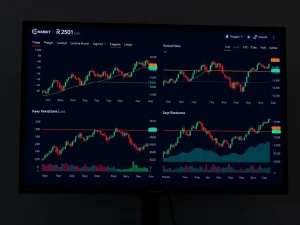Urgent Pause: US Court Halts SEC Crypto Lawsuit Amid Leadership Change

In a dramatic turn of events for the cryptocurrency world, a US federal court has temporarily suspended a significant lawsuit against the Securities and Exchange Commission (SEC). This legal action, initiated by 18 state attorneys general and the DeFi Education Fund, aimed to challenge the SEC’s regulatory reach in the crypto space. The unexpected pause comes in the wake of a leadership transition at the SEC, suggesting a potential shift in the agency’s approach to crypto regulation. Let’s dive into the details of this developing story and what it could mean for the future of digital assets.
Why the Sudden Pause in the SEC Lawsuit?
The halt was ordered by Kentucky District Court Judge Gregory Van Tatenhove, granting a 60-day stay to the proceedings. This decision followed a filing from the SEC itself, hinting that the case’s core issues might be resolved under its new leadership. This suggests a possible willingness from the SEC to reconsider its stance or seek alternative resolutions, especially with Paul Atkins now at the helm as the new SEC chair. The court has mandated all parties to submit a joint status report within 30 days, signaling active monitoring of the situation and a need for timely updates.
Leadership Change at SEC: A New Direction for Crypto Regulation?
The recent leadership change at the SEC is a pivotal factor in this legal pause. Paul Atkins, a known Wall Street advisor with ties to crypto advocacy groups, has taken over as the new chair. This transition marks a departure from the previous leadership under Gary Gensler, who was often perceived as taking a stricter stance on crypto regulation. The shift raises questions about whether the SEC will adopt a more collaborative or nuanced approach towards the crypto industry moving forward. Will Atkins’ appointment lead to a softening of the SEC’s enforcement actions, or will it simply represent a change in style while maintaining a similar regulatory trajectory?
State Attorneys General vs. SEC: Unpacking the Crypto Lawsuit
The SEC lawsuit was initiated by 18 Republican state attorneys general, alongside the DeFi Education Fund, in November. Their core argument was that the SEC had overstepped its legal boundaries by aggressively targeting crypto exchanges. They accused the regulator, under the previous leadership of Gary Gensler, of “gross government overreach.” The states involved in this legal challenge represent a significant bloc, including Nebraska, Tennessee, Wyoming, Kentucky, West Virginia, Iowa, Texas, Mississippi, Ohio, Montana, Indiana, Oklahoma, and Florida. Their unified stance highlights a growing concern among state officials regarding the SEC’s approach to crypto regulation and its potential impact on state economies and innovation.
Key Grievances in the State AGs’ Lawsuit:
- Alleged Overreach: The lawsuit claims the SEC is attempting to unilaterally seize regulatory power from individual states without explicit Congressional authorization.
- Enforcement Actions: States argue that the SEC’s series of enforcement actions against crypto entities are excessive and stifle innovation within the digital asset space.
- Lack of Clarity: Critics have consistently pointed to a lack of clear regulatory guidelines from the SEC, leading to confusion and uncertainty for crypto businesses.
The lawsuit underscores the ongoing tension between federal regulators and the crypto industry, particularly concerning the definition of securities and the extent of SEC jurisdiction over digital assets.
DeFi Groups Drop IRS Lawsuit: A Sign of Broader Regulatory Shifts?
Interestingly, around the same time as the SEC lawsuit pause, the DeFi Education Fund, along with the Blockchain Association and Texas Blockchain Council, voluntarily dismissed their lawsuit against the Internal Revenue Service (IRS). This separate DeFi-related legal action challenged the IRS’s so-called “DeFi broker rule,” which was deemed by the plaintiffs as exceeding the agency’s authority and potentially unconstitutional. The dismissal occurred because the rule was revoked following President Trump’s signing of a bill on April 11. This simultaneous legal development, coupled with the SEC’s leadership change, could indicate a broader trend of regulatory reassessment and potential adjustments in the US approach to digital asset oversight. Are we witnessing the beginning of a more industry-friendly regulatory environment, or are these just temporary pauses before a renewed regulatory push?
Looking Ahead: What’s Next for Crypto Regulation and the SEC?
The 60-day stay in the SEC lawsuit provides a crucial window for all parties involved. It offers an opportunity for the new SEC leadership to engage in dialogue with the state attorneys general and the crypto industry. The required joint status report in 30 days will be a key indicator of the direction discussions are heading. The crypto community will be keenly watching to see if this pause translates into meaningful policy changes, clearer regulatory frameworks, and a more collaborative relationship between regulators and innovators. The future of crypto regulation in the US remains uncertain, but these recent developments suggest a potentially significant shift in the landscape.
Stay tuned for further updates as this story unfolds and impacts the dynamic world of cryptocurrency and its regulation.










